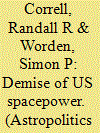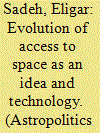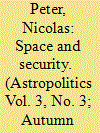| Srl | Item |
| 1 |
ID:
071026


|
|
|
|
|
| Publication |
2005.
|
| Summary/Abstract |
Spacepower is a critical element supporting the US national security strategy. As more nations gain access to technology, there is growing concern that space capabilities will be increasingly vulnerable to attack. However, a more insidious problem looms. For the last decade, the development and acquisition of US national security space systems have become more and more troubled with cost overruns and schedule delays. This grave situation has caught the attention of national security leadership and the US Congress. Panels of experts have proposed a litany of remedies. In this paper we explain and illustrate the importance of enhancing space power to better support national security needs and caution that many of the proposed acquisition solutions address symptoms, not the primary cause.
|
|
|
|
|
|
|
|
|
|
|
|
|
|
|
|
| 2 |
ID:
071031


|
|
|
|
|
| Publication |
2005.
|
| Summary/Abstract |
The focus of this paper is on the evolution of access to space from its beginnings as an idea to its implementation as a usable technology. This evolution takes place through the policy process that encompasses agenda setting, formulation, implementation and change. Agenda-setting is where the idea for access to space emerges. Formulation concerns the concepts and policies that then allow for implementation of launch vehicle technology. Implementation generates specific outcomes. These outcomes are initially characterized by rapid technological innovation followed by a steady state of development. The path of development is one of how access to space became wedded to national security. Changes occur as commerce and economics begin to play a role in access to space. The policy process evolves through the actions of the pertinent actors. An examination of the ways in which these pertinent actors interpreted, formulated and implemented the idea and technology of access to space is discussed. The interactions among actors take place on the basis of political, organizational and technical decisions that actors make in regard to access to space.
|
|
|
|
|
|
|
|
|
|
|
|
|
|
|
|
| 3 |
ID:
071028


|
|
|
|
|
| Publication |
2005.
|
| Summary/Abstract |
Space systems have grown increasingly integral to the United States' national security in the post-Cold War era. The diplomatic and military leverage that space capabilities can provide is not going unnoticed by other countries. Since the collapse of the USSR, the United States has enjoyed a near-absolute dominance in space activities. Only the civilian European space program has mounted any sort of technical challenge to the United States, with little interest devoted to space military activities, but the period of US hegemony in the space military domain might come to an end. In recent years the European Union (EU) and its member states have taken numerous steps towards designing and assembling a Common Foreign and Security Policy and a coherent European Security and Defence Policy. Furthermore, several important steps toward linking security needs and space capabilities have been taken by the tandem European Union-European Space Agency and other relevant institutions. Space is now seen as an essential asset for European integration and for non-dependence in the current geo-strategic context, since space-based systems and derived information can bring necessary capabilities for autonomous decision making. The development of an integrated European space capability for security is at an early stage, but it is an ongoing process presenting some opportunities to enhance European independence and security.
|
|
|
|
|
|
|
|
|
|
|
|
|
|
|
|
| 4 |
ID:
071030


|
|
|
|
|
| Publication |
2005.
|
| Summary/Abstract |
Attempts to address the transatlantic capabilities gap in military space is complicated by the rivalry between NATO and the European Union's ambition to undertake a greater role in European security, as well as being held hostage by the extent and nature of the EU's role in this crucial policy area. In light of this, transatlantic military space cooperation is likely to be modest and on a bilateral basis between Washington and the various European capitals, though NATO may yet play a larger role in this area.
|
|
|
|
|
|
|
|
|
|
|
|
|
|
|
|